| "Gem
Wealth of Madagascar" explored at GIA |
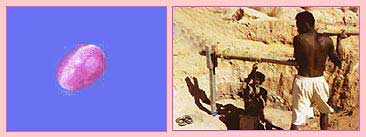 |
|
The gem-rich
"Red Island" of Madagascar was explored during a recent
presentation at GIA's Carlsbad, Calif. headquarters. "Gem Wealth
of Madagascar" was presented by Brendan Laurs, editor of the
Institute's award-winning quarterly journal Gems & Gemology,
and GIA Museum, this was a lecture in the "Color Perspectives"
series dedicated to color in gems. |
|
Almost
every known gemstone can also be found on Madagascar. Brendan Laurs and
Edward Boehm transported the audience on a virtual tour to mines that
produce sapphire, tourmaline, and the newly discovered gem, pezzottaite.
In addition, a unique display of photos, historical books, and gems from
Madagascar, including pezzottaite, kunzite, rubies, and sapphires, were
on view durling the presentation. Attendees also had the opportunity to
examie inclusions in gem samples from Madagascar through a gemological
microscope
"The llakaka region in south-central Madagascar
has become well known as a source of fine sapphires and related gem materials,"
said Mr Laurs, who visited the region in November 1999 and in July 2003.
"Edward and I tried to convey what it is like to visit this gem hot
spot. I then described the occurrence of the world's newest gem mineral,
pezzottaite. When I visited the mine with Dr. Pezzotta - - after whom
the mineral was named - - we were the second group of Westerners to go
there since the gem was discovered in November 2002." "Thanks
to Brendan and Edward, we are able to bring the latest information on
gem deposits and the mines of Madagascar to our students and guests,"
said GIA Museum Director Elise Misiorowski."This really gave them
the insider edge in the gemological world." www.gia.edu |
|
| True
North Gems acquires Baffin Island sapphire discovery |
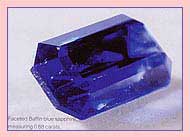 |
|
True
North Gems is a public company listed on the TSX Venture exchange
and is engaged in the exploration and development of North American
coloured gemstone deposits. The company has now optioned 100% interest
in two properties on Baffin Island, Canada with confirmed sapphire
mineralization of exceptional blue colour. The property package
encompasses 1,004 hectares (2,482 acres). This acquisition is another
significant step in True North Gems becoming North America's premier
coloured gemstone company. "The Baffin Island sapphire properties
are excellent additions to True North Gems' property portfolio.
We are very excited
about this acquisition because the sapphires recovered from the
properties are naturally deep, pure blue with purple overtones and
as such represent a rare type of occurrence," said Bernie Gaboury,
President and C.O.O. of True North Gems. True North Gems has committed
to spend C$ 125,000 on exploration and development over four years. |
|
| True
North Gems cuts laser incribed 2.39 carat emerald |
True North
Gemsnhas also announced that a 2.39 carat emerald has been faceted from
collected underground during the 2003 exploration program at the Company's
Regal Ridge emerald project in the Canadian Yukon. This is the largest
emerald faceted from a Canadian source.
The 2.39-carat emerald
was cut from a 3.31-gram (16.55 carat) rough emerald. It is classified
as vslbG 5/5 stone and ranks as a "top value" stone according
to GIA's Emerald Color Value designation. "The 2.39 carat gemstone
offers evidence that the quality and quantity of gem emeralds can improve
as we continue exploration underground," said Bernie Gaboury, President
and COO of True North Gems. "This also validates our exploration
model for predicting the location of gem quality emerald deposits."
This is the first
Canadian emerald gemstone to be laser inscribed to provide a permanent
marker that authenticates its origin and identification. Though laser
technology is currently in use to certify and trademark Canadian diamonds,
the application of innovative cold laser technology is required to successfully
perform the same function on emerald.
|
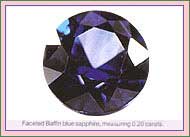 |
|
The
company has reported that 5,801.05 grams (29,005 carats) of gem
and near-gem emeralds were recovered from 465.1 tonnes of underground
and surface trenched material during the 2003 exploration program
at the Company's Regal Ridge Project. Emeralds were recovered from
representative samples collected durling underground work conducted
on the Southwest Zone and from surface trenching at the Mattscar
Pit 1, two of the 13 confirmed zones of emerald mineralization on
the property.
The Southwest Zone Underground Excavation A total of 3,224.8 grams
(16,123.9 carats) of gem and near-gem emeralds were recovered from
the 272.7 tonne random sample of emerald mineralized material extracted
from underground. All emeralds sorted measured in excess of two
millimetres. Gem quality emeralds accounted for 285.84 grams (1,429.2
carats) averaging 1.05 grams (5.25 carats) per tonne, while 2,938.94
grams (14,694.7 carats) of near-gem emeralds were collected averaging
10.78 grams (53.9 carats) per tone. "The number of emeralds
recovered from the underground work on the Southwest Zone is exceptionally
good. More encouraging is the improvement in quality and size of
the emeralds we discovered underground this year, "said Mr
Gaboury,
"This work has established
the continuity of structureand grade of the emerald mineralization
and reaffirms our belief that Regal Ridge has the potential to
become an economically viable emerald deposit," he added.1,781.2
tonnes of emerald mineralized material was extracted from surface
trenching in eight pits from the Mattscar. A total of 2,576.27
grams (12,881.35 carats) of gem and near gem emeralds were recovered
from the 192.4 tonne sample. Gem quality emeralds accounted for
241.30 grams (1206.5 carats) averaging 1.25 grams (6.25 carats)
per tonne, while 2,334.97 grams (11,674.85 carats) of near-gem
emeralds were collected averaging 12.14 (60.7 carats) per tonne.
www.truenorthgems.com
|
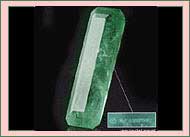 |
|
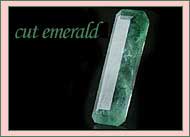 |
|
|
|
| Tanzania
eyes tanzanite cutting zone |
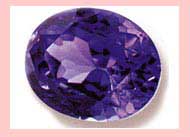 |
|
The Tanzanian government will establish an Export Processing Zone
(EPZ) in Arusha, aiming at turning Mererani into a center for mining
and processing tanzanite. Ibrahim Msabaha, deputy minister for energy
and minerals, said the EPZ tanzanite was necessary to generate more
revenue from exports through added value. "Already the government
is carrying out the groundwork for transforming Mererani into a
controlled area," Mr Msabaha said.
In a move to implement the government
directive on banning export of unprocessed tanzanite, the Ministry
of Energy and Minerals sent a delegation to India and Thailand to
look at setting up joint tanzanite processing and jewelry center
in Tanzania. The visit resulted in a Memorandum of Understanding
with the Indian government to study the establishment of gemstone
centers in Tanzania.
|
|
| Japan
designates emerald as stone of 2004 |
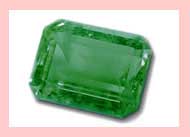 |
|
The Japan Jewelers Association (JJA)
has designated emerald as the stone of 2004. The association has organized
a series of promotional events to promote emerald jewellery starting
with Japan Jewellery Day in November 2003. This follows the JJA's
campaigns for sapphire in 2003 and ruby in 2002. Colombia is the second
biggest supplier of emeralds to Japan. The Colombian Emerald Association
has organized a special committee called EYECO4 consisting of 35 emerald
importers and 4 suppliers with the Colombian to promote the campaign
nationwide. |
|
|
| Gem
market report |
Blue
Sapphire
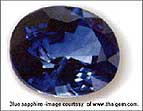 On
the heels on last years beryllium treated orange -pink sapphire debate
comes the new gem treatment issue that saw its first published report
land on the AGTA desk recently. The precise manner in which blue sapphires
are being treated isn't known for sure, but its effect is similar to diffusion:
The treatment creates a light blue to colorless surface layer in an otherwise
dark blue gemstone, lightening its color, making it more visually appealing
and therefore a more sought-after commodity On
the heels on last years beryllium treated orange -pink sapphire debate
comes the new gem treatment issue that saw its first published report
land on the AGTA desk recently. The precise manner in which blue sapphires
are being treated isn't known for sure, but its effect is similar to diffusion:
The treatment creates a light blue to colorless surface layer in an otherwise
dark blue gemstone, lightening its color, making it more visually appealing
and therefore a more sought-after commodity.
The brand new treatment is detectable by
immersing a treated sapphire in methylene iodide and viewing it under
it under it under a diffuse light source. Under these conditions a light
rim around the edge of the sapphire is clearly visible. The report identified
most of the treated gemstones were between two and seventeen carats in
weight and originating predominantly in Sri Lanka.
Interestingly enough, at a panel discussion
on beryllium diffusion in sapphire at the Tucson Show last February, researchers
reported that beryllium diffusion had been used to produce this effect
in very dark sapphire. The AGTA announcement suggested however that no
trace of beryllium had been found in any of the sapphires they tested,
though they didn't rule out diffusion with a different element. |
Diamond
The stark uncertainties brought on by
a civil war raging in the Democratic Republic of Congo since 1998 are
new subsiding, but the sale of 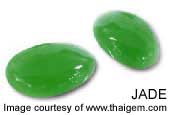 conflict
diamonds from the Congo is still a burgeoning business, and De Beers were
linked to this unwelcome activity last month through a report complied
by a group of independent analysts. The scramble for diamonds in countries
suchas the Democratic Republic of Congo (DRC) has been blamed for fuelling
war and instability in many African nations and with official diamond
exports of some US$400 million a year, its easy to see their reasons.
The report is to be discussed by the UN and indicates tainted diamonds
have been filtering through consumer channels via two of De Beers clients
(sight holders) which are in breach of international guidelines. De Beers
spokespeople are outraged by the contents of the document and thus far
are yet to receive clarification on a number of points they raised in
their defense. conflict
diamonds from the Congo is still a burgeoning business, and De Beers were
linked to this unwelcome activity last month through a report complied
by a group of independent analysts. The scramble for diamonds in countries
suchas the Democratic Republic of Congo (DRC) has been blamed for fuelling
war and instability in many African nations and with official diamond
exports of some US$400 million a year, its easy to see their reasons.
The report is to be discussed by the UN and indicates tainted diamonds
have been filtering through consumer channels via two of De Beers clients
(sight holders) which are in breach of international guidelines. De Beers
spokespeople are outraged by the contents of the document and thus far
are yet to receive clarification on a number of points they raised in
their defense.
Myanmar
Myanmar's annual October gem auction
produced US$17.6-million for the state and its mining businesses, a little
down on last year's figures due to weakened international participation.
Experts in the region's trade cite SARS and the Iraq conflict as factors
that reduced profits this year. Just 348 of over 1,000 rough jade lots
found buyers this year, netting US$7.9-million compared to US$8.6-million
last October. Sales of ruby, sapphire, spinel, aquamarine and garnet were
affected for similar reasons. Experts in Myanmar feel the downturn matched
the general malaise in the country's flailing economy, which has been
affected by Washington's decision to install trade sanctions. On a more
Lustrous note, while jade and gem sales slipped, sales of pearls soared
75% to US$175. More than 838 gem merchants, including 457 overseas buyers
from nine countries attended the event.
www.thaigem.com |
|



